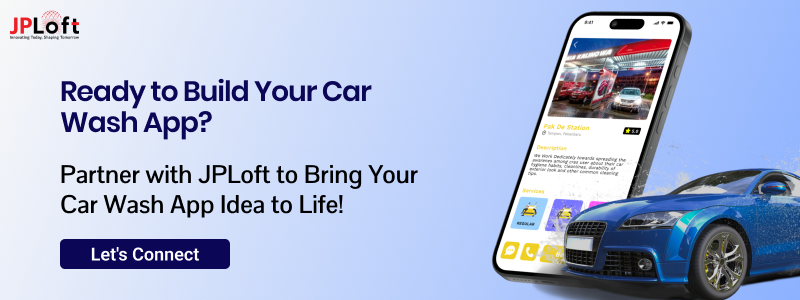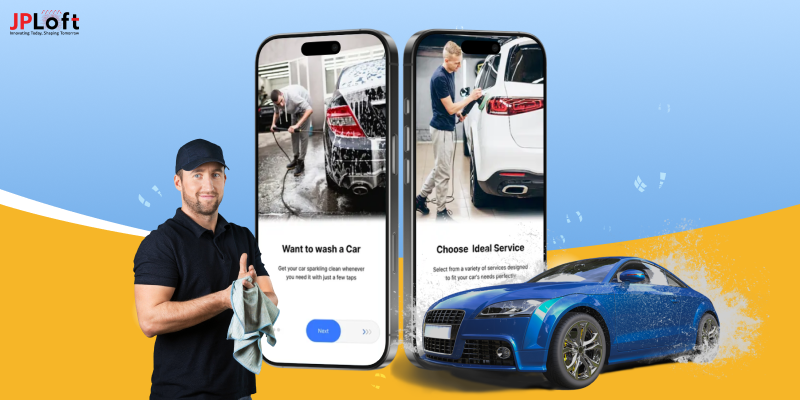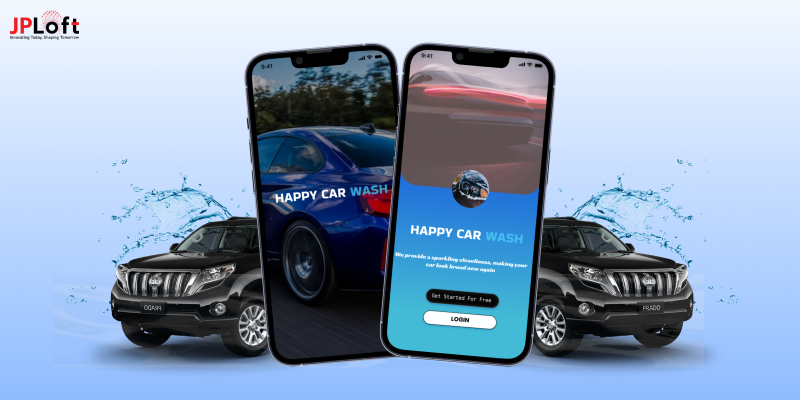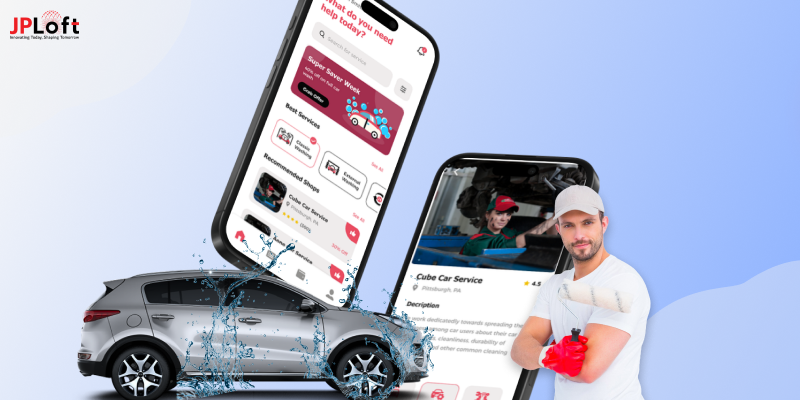Owning a car is convenient, but keeping it clean can be a real struggle. Finding the right car wash service, waiting in long queues, or managing regular maintenance schedules can be time-consuming and frustrating.
This is where car wash apps come in. With just a few taps, users can book a car wash at their preferred time and location, making car maintenance easier than ever.
The global car detailing service market was valued at $33.27 billion in 2022 and is expected to reach $50.86 billion by 2030, growing at a CAGR of 5.4%.
With such impressive figures, investors are eyeing this industry as a lucrative opportunity. However, building a successful car wash app is not as easy as it seems.
Developers and entrepreneurs must overcome several challenges while developing a car wash app for smooth functioning.
But worry not! We’ve compiled a list of the most common car wash app development challenges along with their solutions to help you navigate the process smoothly. Let’s dive in!
Why is a Car Wash App Profitable for Your Detailing and Washing Business?
Running a car wash or detailing business can be challenging, especially when it comes to attracting new customers and managing operations efficiently.
However, with the rise of car wash apps, businesses can automate bookings, reach more customers, and increase profits.
Here’s why investing in a car wash app can be highly profitable for your business.
1. Convenience for Customers = More Business
Today, people prefer services that save them time and effort. With a car wash app, customers can book a wash anytime, anywhere, without waiting in long queues. This ease of access encourages repeat bookings, ensuring steady revenue for your business.
2. Higher Customer Retention
Traditional car washes rely on walk-in customers, but an app allows you to offer memberships, loyalty programs, and discounts to keep customers coming back. Features like push notifications can remind users when it’s time for their next wash, increasing repeat business.
3. More Bookings, Less Hassle
A car wash app automates the booking process, reducing the need for manual scheduling. Customers can choose a time slot, select a service, and even make payments, all within the app. This helps you avoid overbooking and manage staff better, making operations smoother.
4. Expand Your Reach
With an app, your car wash business isn’t limited to just walk-in customers. You can reach a larger audience, including people who prefer mobile car wash services at their doorstep. This can significantly increase revenue, especially if you offer on-demand services.
5. Secure and Faster Payments
Handling cash can be a hassle. A car wash app integrates secure online payment options, making transactions easy for both customers and business owners. You get instant payments without worrying about handling cash or delayed payments.
6. Competitive Advantage
Many car wash businesses still operate traditionally. By investing in an app, you get an edge over competitors who rely solely on walk-ins. Offering modern booking solutions makes your brand more professional and trustworthy.
7. Boost Revenue with Additional Services
A car wash app allows you to offer premium services like interior detailing, ceramic coatings, and waxing. Customers can explore and book these services easily, leading to higher average spending per customer.
8. Data-Driven Business Growth
With an app, you can track customer behavior, service preferences, and peak booking times. This data helps in improving marketing strategies and optimizing services to increase revenue.
If you're looking to develop a car wash app, understanding its profitability is just the first step. Let’s analyse the challenges that you might face in your mobile app development journey.
What Are the Common Development Challenges for a Car Wash App?
Developing a car wash app may seem like a straightforward process, but it comes with its fair share of technical and operational hurdles.
From managing bookings to integrating secure payments, various obstacles can impact the app's efficiency and user experience.
Here’s a list of car wash app challenges and their solutions to help you build a seamless and profitable platform.
► Real-Time Booking and Scheduling Issues
One of the biggest development challenges in car wash apps is managing real-time bookings efficiently.
Without proper scheduling, double bookings, delays, and service provider unavailability can frustrate users. A smart scheduling system with AI-driven slot management can help optimize bookings.
Features like auto-assignment, time buffers, and real-time availability tracking can significantly improve efficiency.
Addressing this challenge may increase your car wash app development cost but it ensures a smoother experience for both customers and service providers.
How to Deal with It?
-
Use AI-based scheduling algorithms that analyze service provider availability, location, and workload to auto-assign bookings optimally. This prevents double bookings and optimizes workforce allocation.
-
Set an automatic buffer time between consecutive bookings to avoid overlap and accommodate unforeseen delays. This ensures a smooth transition between customers.
-
Provide a flexible rescheduling option with prior notice, so customers can modify bookings if needed, reducing last-minute cancellations.
-
Integrate live notifications and SMS alerts to keep customers and service providers informed about appointment status, delays, and estimated arrival times.
► GPS and Location-Based Services
Accurate GPS tracking is a must for on-demand car wash apps, yet it poses a common development challenge for a car wash app.
Poor location accuracy can lead to service delays, incorrect addresses, and operational inefficiencies. Integrating Google Maps API or Mapbox, using geofencing for precise service areas, and implementing real-time tracking can resolve this issue.
It is a common development challenge for car wash apps. However, solving it ensures seamless navigation for service providers and users.
How to Deal with It?
-
Integrate Google Maps API, OpenStreetMap, or Mapbox for accurate geolocation tracking and navigation.
-
Advanced algorithms can adjust minor location errors and enhance accuracy, reducing incorrect addresses.
-
Set predefined service areas using geofencing technology to prevent service requests from out-of-coverage areas.
-
Show customers real-time movement of service providers, estimated time of arrival (ETA), and live route tracking to enhance transparency.
► Payment Integration and Security
Ensuring smooth and secure transactions is a major development challenge of car wash apps. Users expect multiple payment options, but integrating credit cards, digital wallets, and UPI payments securely is complex.
Adopting PCI-DSS compliance, end-to-end encryption, and multi-factor authentication can enhance security. A fail-proof refund and dispute resolution system can also build trust.
Addressing this car wash app development challenge ensures seamless financial transactions for customers and service providers.
How to Deal with It?
-
Use reliable gateways like Stripe, PayPal, Razorpay, or Square that support multiple payment methods, ensuring seamless transactions.
-
Secure all transactions using AES-256 encryption to protect sensitive user data and prevent fraud.
-
Require OTP verification or biometric authentication to authorize payments, reducing unauthorized transactions.
-
Create a transparent refund mechanism where customers can request refunds for service failures, building trust in the platform.
-
Use AI-driven fraud detection systems to identify suspicious activities and prevent payment fraud.
► Service Customization & Pricing
Offering flexible pricing based on car size, service type, and location is one of the top development challenges of a car wash app.
Without proper customization, users may feel overcharged or underserved. Implementing dynamic pricing models, AI-driven recommendations, and personalized service packages can help.
Overcoming this challenge for car wash worldwide ensures competitive pricing and better customer satisfaction.
How to Deal with It?
-
AI-powered pricing tools analyze real-time demand, peak hours, location, and service complexity to dynamically adjust pricing. This prevents overpricing during low demand and maximizes revenue during peak hours.
-
Let customers choose add-ons like interior detailing, waxing, or eco-friendly washes to personalize their service. A modular service selection system ensures customers only pay for what they need.
-
Introduce monthly or yearly subscription plans for frequent customers. Discounts on bulk services can increase customer retention and build brand loyalty.
-
Clearly display the cost breakdown for each service (e.g., labor, materials, service type) to build trust and avoid confusion.
► User Experience and App Performance
A slow or cluttered interface leads to high abandonment rates, making UX one of the main development challenges of a car wash app. While developing a car wash app UI/UX plays a key role in offering enhanced experience to users.
Users expect a fast, intuitive, and bug-free experience. Regular UI/UX testing, performance optimization, and lightweight coding frameworks can improve app speed. Adopting progressive web app (PWA) technology can further enhance performance, ensuring that users stay engaged.
By addressing this ultimate guide to development challenges of a car wash app, businesses can attract and retain more customers.
How to Deal with It?
-
Creating an app like MobileWash or any other with a clean, minimalistic UI with easy-to-use navigation, clear CTA buttons, and a hassle-free booking process improves user engagement.
-
Apps should load within 2-3 seconds. Use lightweight frameworks, optimize images, and reduce unnecessary animations to enhance speed.
-
Perform frequent usability tests, stress tests, and A/B testing to detect and eliminate performance issues before they affect users.
-
PWAs provide app-like experiences on browsers without requiring downloads. They load faster, work offline, and are cost-effective for businesses.
► Managing Service Providers & Workforce
One of the biggest development challenges in car wash apps is efficiently managing service providers.
Ensuring their availability, tracking their performance, and maintaining service quality can be overwhelming. Unreliable scheduling or lack of skilled professionals can lead to poor customer experiences.
To tackle this, car wash app development challenges can be addressed by implementing an AI-powered workforce management system that assigns tasks based on location and expertise.
Additionally, a rating and feedback system ensures quality control and helps customers choose the best service provider.
How to Deal with It?
-
A central dashboard can help managers track service provider availability, work hours, and assigned bookings in real-time.
-
Allow customers to rate and review service providers based on punctuality, service quality, and professionalism. Low-rated providers can be retrained or removed to maintain high standards.
-
AI-based algorithms can match jobs to the most suitable service provider based on location, skills, and availability. This reduces waiting times and improves service efficiency.
-
Hire dedicated developers to improve service quality. Certification badges for experienced professionals can boost customer trust.
► Marketing & Customer Engagement Features
Even the best app won’t succeed without an effective marketing strategy.
One of the major development challenges of car wash apps is acquiring and retaining users. Without promotions, customers may opt for traditional car washes. To overcome this challenge while developing a car wash app, integrate push notifications, loyalty programs, and referral incentives.
AI-based recommendations can personalize promotions, boosting user engagement. Email marketing and social media campaigns further help in creating a strong brand presence, ultimately increasing bookings.
How to Deal with It?
-
Automated discount alerts, service reminders, and exclusive deals keep users engaged and encourage repeat bookings.
-
Offering discounts for referrals and rewarding frequent users with exclusive perks helps in customer retention.
-
AI-driven analytics can help segment users based on behavior, allowing businesses to send personalized service recommendations and offers.
-
Running targeted ad campaigns on social media platforms and engaging customers via email newsletters ensures higher conversions and brand recall.
► Scalability & Future Growth
Expanding the business to multiple cities or countries poses one of the top development challenges of a car wash app.
The app must handle increased traffic, additional service providers, and multi-currency or language support. A cloud-based infrastructure ensures seamless scalability without performance lags.
Cost to develop a car wash app with modular app design is generally higher but it allows easy feature enhancements. Overcoming this challenge while building a car wash app ensures that your platform grows with business needs without frequent redesigns.
How to Deal with It?
-
Cloud storage solutions like AWS, Google Cloud, or Azure help manage high traffic loads without performance lags.
-
A modular app design with microservices allows easy addition of new features, service providers, and locations without disrupting existing users.
-
As the business expands globally, providing localized content and region-specific pricing enhances user convenience and accessibility.
-
AI-powered verification and automated approval systems ensure smooth integration of new service providers in different locations.
► Compliance with Legal & Safety Regulations
Meeting legal standards is among the common development challenges for a car wash app.
Various regions impose strict regulations on water usage, data security, and environmental impact. Failing to comply can result in fines or operational restrictions.
To address this, ensure the app follows GDPR, PCI-DSS, and environmental guidelines. Partnering with eco-friendly service providers and integrating digital consent forms can also help maintain compliance.
Addressing challenges for car wash worldwide ensures seamless operations across different markets.
How to Deal with It?
-
Partner with legal consultants to ensure that data privacy, payment security, and environmental guidelines are followed.
-
Encouraging waterless car wash services and biodegradable cleaning solutions minimizes the environmental impact.
-
Customers can digitally acknowledge the service terms, ensuring compliance with local consumer protection laws.
-
Offering liability coverage and accident protection builds trust and minimizes legal risks.
► Maintenance and Regular Updates
Post-launch maintenance is one of the main development challenges of a car wash app.
Regular updates are crucial to fix bugs, improve UI/UX, and introduce new car wash features. Ignoring maintenance can lead to crashes, slow performance, and security vulnerabilities.
The ultimate guide to development challenges of a car wash app suggests conducting regular security audits, performance monitoring, and user feedback analysis to ensure smooth functionality.
A dedicated support team and automated testing further minimize downtime and improve user satisfaction.
How to Deal with It?
-
Continuous updates help fix bugs, improve app performance, and introduce new features that keep users engaged.
-
Collect real-time user reviews and feature requests to make data-driven improvements in the app.
-
Regular testing ensures that the app runs smoothly on new smartphones, tablets, and different operating systems.
-
Implementing AI-based performance monitoring tools helps detect bugs, crashes, and security threats before they affect users.
How JPLoft Can Help You Overcome Your Car Wash App Development Challenges?
Developing a successful car wash app comes with multiple challenges, from real-time booking management to payment security, scalability, and marketing features.
At JPLoft, we have the expertise to handle these obstacles and deliver a seamless, feature-rich car wash app tailored to your business needs.
We as a top car wash app development company integrate AI-driven scheduling, secure payment gateways, real-time GPS tracking, and user-friendly interfaces to enhance customer experience.
Our cloud-based infrastructure ensures easy scalability, allowing your business to expand without performance issues.
Whether you're looking to develop an on-demand car wash app or improve an existing one, JPLoft provides end-to-end development services to ensure a hassle-free experience.
Wrapping Up
Developing a car wash app is an exciting yet challenging journey.
From real-time booking management and secure payments to scalability and regulatory compliance, overcoming these hurdles is crucial for a smooth and successful app launch.
While these common development challenges for car wash apps may seem overwhelming, the right strategies that can help you navigate them effectively.
By addressing these major development challenges of car wash apps, you can create a user-friendly, efficient, and scalable platform that meets customer expectations and drives business growth.
If you're planning to develop a car wash app, choosing the right development partner is essential.
FAQs
Some of the main development challenges of a car wash app include real-time booking issues, GPS inaccuracies, secure payment integration, scalability, service customization, and regulatory compliance. Addressing these challenges ensures a smooth user experience and business growth.
To tackle real-time booking challenges, implement an AI-powered scheduling system that auto-assigns slots based on availability, prevents double bookings, and allows real-time status tracking for customers.
The cost to develop a car wash app ranges between $20,00 to $100,000+ depending on features, technology stack, development team, and customization needs. For a detailed breakdown, consult an experienced app development company like JPLoft
For smooth scalability, your car wash app should have cloud-based architecture, multi-location support, multi-currency options, and a modular design that allows adding new features without major overhauls.
To overcome customer engagement challenges, integrate push notifications, loyalty programs, referral incentives, AI-based recommendations, and social media marketing to keep users engaged and encourage repeat bookings.














Share this blog